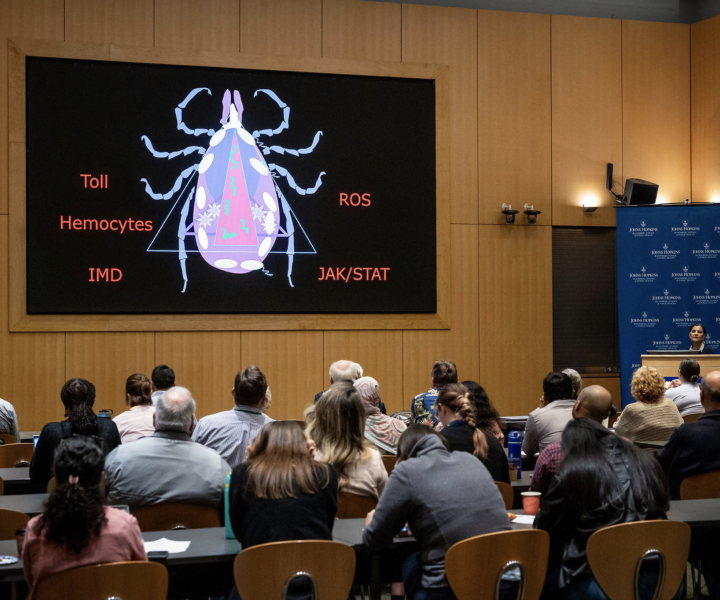Lyme and Tickborne Diseases Research and Education Institute
Anya J. O'Neal, PhD
We are excited to welcome Anya O'Neal to LTBDI as an Assistant Professor! Anya studies tick-borne diseases and how ticks use their immune system to harbor and transmit human pathogens. Her research focuses on 1) how tick immunity shapes the physiology and competence of the vector, and 2) how their immune systems can be targeted to limit the spread of disease. The O’Neal lab uses interdisciplinary approaches, such as biochemical, metabolic, genetic, entomological, molecular, cell biological, and epidemiological analyses, to understand mechanisms at the vector-host-pathogen interface.

About the Institute
The Johns Hopkins Lyme and Tickborne Diseases Research and Education Institute (LTBDI) is led by inaugural director Nicole Baumgarth, PhD, DVM. The Institute resides in the Bloomberg School’s Department of Molecular Microbiology and Immunology (MMI). Baumgarth leads the Institute’s research in four areas: vector/tick biology, epidemiology, microbiology, and host immune defense. The Institute focuses on research training and public outreach centered around the increasing threats of Lyme and other tickborne diseases to public health. In addition to Lyme disease, ticks play a role as carriers and reservoirs in over a dozen lesser-known diseases. Some, like Rocky Mountain spotted fever, are caused by bacteria, while others are caused by parasites or viruses.
Mission
Leading research and education on Lyme and other tickborne diseases to advance public health
Vision
To create a society in which an informed public will be protected from tick bites and the diseases they carry through education and provision of effective prophylaxes; and to ensure healthcare providers have access to improved and new diagnostics and therapies to better help those affected by a tickborne illness.
Find a Tick? Send it to LTBDI!
LTBDI has partnered with Maryland Department of Health to identify ticks sent in by the public. If you or anyone you know finds a tick(s) and wants the species to be identified, please follow these instructions:
- Put the removed tick into a sealable plastic bag.
- Put that sealed bag into another sealable plastic bag.
- Complete the MDH 4814 TICK IDENTIFICATION FORM for each tick you submit
- Send the tick(s) and completed form (be sure to include your email address) to:
Johns Hopkins Lyme and Tickborne Diseases Research and Education Institute
Dr. Douglas Norris, Johns Hopkins Bloomberg School of Public Health
615 N Wolfe St. Rm 5132, Baltimore, MD 21205
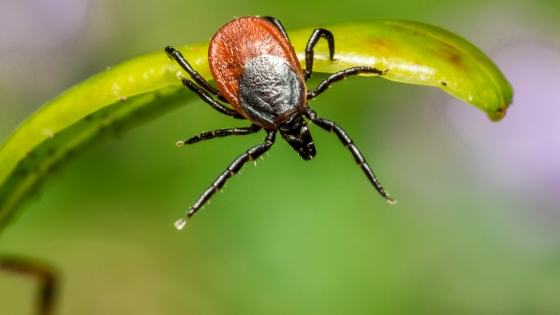
Institute News
Spring Newsletter
We are pleased to share our Spring newsletter, where we highlight our events, projects, and team members.
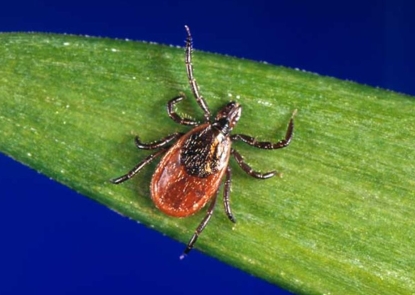
It's Tick Season - Public Health On Call Podcast
In this episode: Dr. Nicole Baumgarth talks all things ticks including how climate change is increasing their territory, the diseases they spread such as Lyme and Heartland virus, disease prevention, and the latest on vaccines and treatments.
Tickborne Diseases Research at Johns Hopkins
Johns Hopkins is home to several entities that focus on tickborne diseases research, diagnosis, and treatment.
In addition to LTBDI at the Bloomberg School of Public Health, the Lyme and Tickborne Diseases Dashboard, led by Frank Curriero at the Johns Hopkins Spatial Science for Public Health Center, harnesses the power of geography in tickborne diseases research.
In the Johns Hopkins School of Medicine, the Sherrilyn and Ken Fisher Center for Environmental and Infectious Diseases, led by Paul Auwaerter, is dedicated to the clinical research of environmental pathogens which improve the diagnosis and treatment of these infections. In addition, the Lyme Disease Research Center, led by John Aucott, is pioneering patient-based multidisciplinary research in all manifestations of Lyme disease.
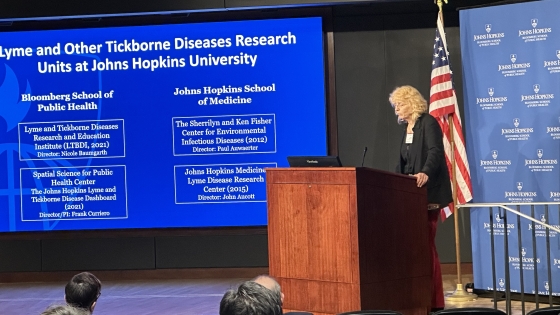
Institute Tickborne Diseases Experts In the News
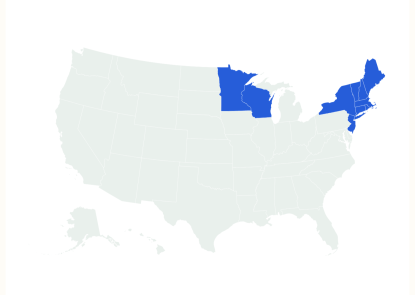
Nicole Baumgarth Explains to Newsweek Why Diagnosing Babesiosis Is So Difficult
Nicole Baumgarth studies Babesiosis, a tickborne disease spread by the same black-legged (deer) tick that carries Lyme disease. Babesiosis spread now mimics the same geographic pattern of Lyme disease in the northeast and midwest.
Doug Norris Gives WBAL-TV a Tour of His Lab and Talks About Tickborne Diseases
Find a tick in your backyard? Mail it to the Norris Lab. Professor Norris & team will identify the tick and the possible diseases it carries.
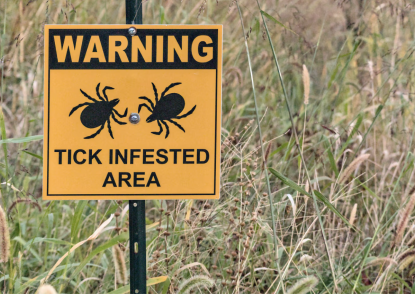
The Wall Street Journal Turns To Thomas Hart To Learn About Tick Behavior
Blood tests for Lyme disease aren’t accurate until three or four weeks after a bite. So if you feel flu-like symptoms in warm weather without respiratory symptoms, a tickborne disease could be a possibility.
Tickborne Diseases in the News
The Tick Detective is Excited to Get your Parasites in the Mail (The Baltimore Banner, July 2025)
The Baltimore Banner
July 29. 2025
The Tick Detective is Excited to Get your Parasites in the Mail
Ticks Are Really Bad This Summer. What to Do About Them (Wall Street Journal, July 2025)
The Wall Street Journal
July 5, 2025
Ticks Are Really Bad This Summer. What to Do About Them
Tick risks vary by region. Here's where diseases have spread and how to stay safe (NPR, June 2025)
How to Stay Safe During Tick Season (New York Times, May 2022)
New York Times
May 27, 2022
How to Stay Safe During Tick Season
It’s tick season and there is a new bugger catching a ride in Baltimore (Baltimore Banner, May 2025)
The Baltimore Banner
May 10, 2025
It’s tick season and there is a new bugger catching a ride in Baltimore
A meat allergy caused by ticks may be popping up in new parts of the U.S. (NBC News, March 2025)
NBC News
March 21, 2025
A meat allergy caused by ticks may be popping up in new parts of the U.S.
Once called Nantucket fever, this nasty tick-borne illness is on the rise (June 10, 2024)
NPR
June 10, 2024
https://www.npr.org/sections/shots-health-news/2024/06/10/nx-s1-4992276/once-called-nantucket-fever-this-nasty-tick-borne-illness-is-on-the-rise
First travel-related death from rare tick-borne virus recorded in Maryland (October 9, 2023)
Ticks Are Bringing Disease to a Backyard Near You (April 12, 2023)
Wall Street Journal
April 12, 2023
Ticks Are Bringing Disease to a Backyard Near You: Bites, infections are increasing as temperatures warm and deer populations grow
Lyme Isn't the Only Disease to Worry About in the Northeast, CDC Says (March 18, 2023)
New York Times
March 18, 2023
Lyme Isn't the Only Tick Disease to Worry About in the Northeast, CDC says
How Climate Change Affects the Spread of Lyme Disease (Time, March 13, 2023)
Time
March 13, 2023
How Climate Change Affects the Spread of Lyme Disease
Deer ticks are benefiting from warming winters in the Northeast. That's raising health concerns (WBUR, February 28, 2023)
WBUR (Boston, MA)
February 28, 2023
Deer ticks are benefiting from warming winters in the Northeast. That's raising health concerns
As winters in the region become more mild, adult deer ticks are becoming more active at a time when they’re normally dormant – causing a bigger public health risk.
U.S. Man's Death Suggests Deadly Tick Virus Is Spreading to New Regions (Gizmodo, February 24, 2023)
Gizmodo
February 24, 2023
U.S. Man's Death Suggests Deadly Tick Virus Is Spreading to New Regions
The rare Heartland virus likely killed a man in 2021, in the first case traced to the Maryland and Virginia area
A Tick Bite Made Them Allergic to Meat (The Atlantic, April 2022)
The Atlantic
April 25, 2022
A Tick Bite Made Them Allergic to Meat: And an organ-transplant company has an unexpected solution
Support the Lyme and Tickborne Diseases Research and Education Institute
The Institute welcomes and appreciates gifts of all kinds. Some donors choose to make a monthly contribution. Other members of our community, including those who have been impacted by Lyme and other tickborne diseases, give a one-time donation. All contributions to study and combat these vicious diseases are accepted with appreciation.
Ticks and Tickborne Diseases Symposium 2026
Reserve your spot at the 2-day Symposium focused on the public health impact of tickborne diseases
Who is the Symposium for?
- Researchers
- Public Health workers
- Advocates for Lyme and other tickborne diseases
